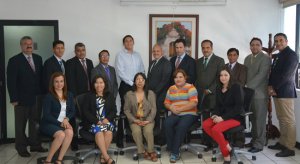CIAT-SECO Cooperation Program – Three years contributing to the strengthening of tax administrations in Latin America and the Caribbean (LAC)

The Inter-American Center of Tax Administration (CIAT) and the State Secretariat for Economic Affairs of the Swiss Government (SECO) have aligned interests and resources in order to identify and support priority issues related to the effective management of tax revenues in Latin America and the Caribbean. This led to the formulation and implementation, in 2015, of the CIAT-SEVO Cooperation Program. The overall objectives of the program are to provide support to promote the mobilization of additional tax revenues, reduce dependence on official development assistance and allow sustainable financing to reduce poverty, and implement development programs.
The tax administrations that have received support – mainly technical-assistance during these three years (April 2015 to March 2018) are: Bolivia, El Salvador, Guatemala, Guyana, Honduras and Nicaragua.

Advisor Renata Fontana and the information Exchange Team of SIN from Bolivia
The National Tax Service (SIN) of Bolivia has received cooperation to implement the rules for the control of transfer pricing, Law No. 516 of 4 April 2014 and Law No. 549 of July 21, 2014, Supreme Decree No. 2227 of 31 December 2014 and Normative Directorate Resolution No. 10-0008-15 of April 30, 2015. The support has enabled to design and implement a system of information, study relevant economic sectors and consequently identify cases of risk of abusive manipulation of transfer prices in these sectors. In this framework, the main sources of information and public databases of useful data for controlling transfer pricing were identified and a system of quantitative and qualitative risk assessment, fed mainly on information obtained as a result of the formal obligations of the taxpayers subject to transfer pricing regime. As a result, the tax administration has been able to identify its first cases of abusive manipulation of transfer prices, which originated Control Orders.
In addition, the Cooperation Program supported the functional organization of the area specializing in international tax matters related to transfer pricing area. Until 2017 three related areas were managing the national data: (1) control, (2) technical and operational procedures, (3) quality control inspection processes. In April 2017, the Departments of Management Control merged into a single department. The new Department of Control and International Taxation provides for the control of transfer pricing, management of information exchange, implementation of agreements to avoid double taxation and treatment of other aspects related to base erosion and profits shifting. The latter issue is a pending issue for the SIN, as yet not part of the BEPS inclusive framework or the Global Forum on Transparency and Exchange of Information for Tax Purposes.
Bolivia, having avoided to take positions on the recommendations and issues raised by the BEPS Action Plan, has requested support from the program to undergo training in order to understand the operation and impact of each of the measures and make informed decisions.
The SIN has also received support in the area of tax compliance control and intelligence. This project has received technical support from officials from SUNAT of Peru, the AEAT of Spain and an independent consultant. Generally speaking, technical assistance has been focused on improving the processes of selection and control of taxpayers. From that approach, four aspects have been considered: the definition of methods for selecting the taxpayers to audit; assessment of available information sources; determining the use of information on the selection criteria of taxpayers to monitor; the construction of variables for selecting taxpayers and data management. In addition, as a result of the assistances, the application of risk management in assessing the behavior of large taxpayers has been powered.
Similarly, the support of the Program contributed to the creation of the Research and Management of Risks area, under the Executive Presidency of SIN in April 2017. The area has two units. The Risk Management Unit aims to identify compliance gaps that may be generated during the lifecycle of the taxpayer, analyze, prioritize, propose preventive and repressive actions, and evaluate the result of the above to correct deviations.
Regarding the selection of taxpayers to be audited, a risk model that applies a selection algorithm for risky taxpayers has been developed. Specifically, as the main results of this work, the definition of an algorithm for identifying risky taxpayers is highlighted by applying indicators defined in a catalog at taxpayer’s level, which assesses the risk of the subject under analysis and development of macro indicators for assessing the economic activities under the International standard Industrial Classification (ISIC), through which it was possible to select the five most risky activities and implement risk indicators of tax noncompliance.
The Directorate General of Internal Taxes (DGII) of El Salvador has received assistance in the control and exchange of information for taxpayers from the massive sector – particularly in the form called “upon request”. Regarding the exchange of information, since 2011, that country is a member of the OECD Global Forum on Transparency and Exchange of Information and was the eighth country in Latin America and the third member of the Central American Common Market (after Costa Rica and Guatemala) that has joined the Multilateral Convention on Mutual Administrative Assistance in tax matters and the 86th signatory to the most complete international instrument to boost cooperation against international tax evasion.
Thanks to the efforts on the issue and support this program, El Salvador has successfully passed Phase II of the Peer Review of the Global Forum on Transparency and Exchange of Information of the OECD. In addition, the program has supported the creation of the Department of Conventions and Information Exchange – designed to address concerning the formulation of conventions and international and interagency agreements on transparency and exchange of information – and provided proposals for strengthening legislation and regulations in tax areas. Among others, the authorization for the exchange of tax information with tax authorities of foreign jurisdictions and the adoption of OECD guidelines on transfer pricing in the field of goods and services prices, which entered into force from Legislative Decree No. 763 on 31 July, 2014, and was incorporated in sub-section 7th, Article 120 of the Tax Code
The DGII has also received support to strengthen the inspection process through the collaboration of technicians from SUNAT of Peru. As a result of this assistance, pilot tests have been conducted aimed at taxpayers with a VAT ratio lower than the optimal ratio of economic activity to which they belong, obtaining satisfactory results regarding the criteria and parameters used. Of the 25 cases selected and programmed, an 84% efficiency rate was obtained, and about $ 60,000 were collected.

Advisor Sebastian Lopez and the Transfer Pricing Team of SAT from Guatemala
The Superintendence of Tax Administration (SAT) of Guatemala, through experts from the SRI of Ecuador, the SAT of Mexico and independent specialists, has received support in the area of control of abusive manipulation of transfer prices. The main result of the assistance was the assessment that the tax authorities should strengthen their capabilities in the area of transfer pricing and extend their control to other issues related to international taxation. For this, the International Taxation Department was created.
The program has assisted in the development of the Technical Guide for the elaboration of a Transfer Pricing Study, which requires almost all of the OECD methodology for the transfer pricing analysis. One of the important issues of the Guide to highlight is the use of the formulas required for performing capital adjustments. These formulas make it possible to achieve greater comparability, since their main objective is to eliminate the implicit interest that accounts receivable and accounts payable of comparable companies may contain. With these adjustments, it is intended to bring the capital accounts of comparable companies to the conditions of the Guatemalan taxpayer.
The SAT has also received support in the area of electronic invoicing. This assistance has enabled progress with the design and approval of SAT decision-making bodies, the new model of electronic invoice and generic receipt model. The technological architecture has already been approved, the standard has been defined as well as the computing requirements. Once the tool is implemented, a strategy for a massive use of electronic invoicing and control their use will be implemented.
For its part, the tax administration of Guyana (GRA) has received support in technical audit of multinational companies. Recommendations on economic sectors to control were formulated, depending on the importance of each sector analyzed and their risk of default, on the technical planning of audits and audit performance techniques.
Guyana is preparing to face an abrupt economic growth, because in the beginning of 2017 it became known that Guyana contains an oil and natural gas wealth that would be among the greatest discoveries of this decade. Experts estimate that only in Liza, one of the oil wells on the Guyanese coast, 1.4 billion of oil barrels mixed with natural gas would be found, a figure comparable with the largest fields in South America that have been drilled. In order to support the country through these new challenges and opportunities, in addition to the training in audit techniques, the program has supported the creation of Large Companies Division. Complementarily, the program has provided specialized assistance on fiscal intelligence and for the review of tax returns and collection processes.

Advisor Oscar Ramos and the International Taxation Team of SAR from Honduras.
The Revenue Management Service (SAR) of Honduras has received assistance on processes related to international taxation by experts from AFIP of Argentina and officials of the Ministry of Finance and Public Credit of Mexico. Through consultancies, it has been possible to support building an institutional operational capacity for the control of international operations, also including the negotiation and implementation of APAs to effectively monitor relevant economic sectors. As a main result, in December 2015, they have notified the first audits of relevant companies in the mining and agricultural sectors, which have shown risk of noncompliance.
As for the second project, Sources of Information and Intelligence Platform, with support from CIAT-SECO program, the SAR has been able to restructure three information regimes, which were incorporated into the management control. With the addition of new sources of information it was possible to identify 20 indicators of risk.
The Directorate General of Revenue (DGI) of Nicaragua has decided to concentrate its capabilities on a single project on the Integral System of Taxpayers’ Service and Assistance. AEAT of Spain has been the transferor organization of knowledge and technological resources, providing a team of official experts for this project.
Before the assistance, it was not possible to know the time it took to provide a service; the measurement that was carried out provided only an estimated average. As a main result of the technical assistance, the taxpayer assistance process has been automated, providing time measurements and other reliable data. The files management service provides information on the distribution of workload among different service channels (windows), allowing to equitably distribute the work or proposing to create additional service channels for a type of service or location.
Thanks to the work of the beneficiary countries and our team of specialists, the program has been running a total of 271 weeks of assistance.
The CIAT Executive Secretariat is grateful to SECO for their significant contribution to the tax administrations of Latin America and the Caribbean in mobilizing internal resources for the regional development and recognizes the effort that our tax administrations have provided as counterpart.
1,909 total views, 6 views today
